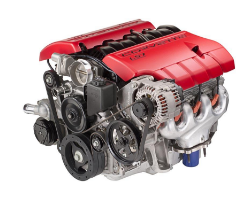
CCA, MCA, PHCA and HCA are all ratings that measure the current of a battery to deliver power to crank an engine.
For many years now cold cranking amperes (CCA) has been widely used as a bench marking measurement to compare batteries. The assumption is “The higher the CCA the better it is and the longer it will last.” Consequently many manufacturers have designed batteries to provide excessively high CCA’s at the expense of other more relevant design factors.
By adding more plates into a battery it is easy to generate high CCA’s, the downside of this however is the thickness and size of the plate and separator material is usually sacrificed. In cold climates, more battery plates and higher CCA’s excel but in warmer climates like Australia, corrosion, water loss, vibration and constant idling may bring this design to an early grave.

So what do these ratings mean?
CCA (Cold Cranking Amperes) is the most popular industry rating and is a measurement of the current a fully charged battery can deliver for 30 seconds and maintain a voltage of 7.2 volts (12 volt battery) at a temperature of -18°C. CCA’s are important, but they are not the best measure for warmer or Australian conditions. They are the ratings used by the battery industry to define a new batteries ability to start an engine in extremely cold temperatures and such are more relevant for the North American and European markets.
MCA (Marine Cranking Amperes) or CA (Cranking Amps) is a measurement of the current a fully charged battery can deliver for 30 seconds and maintain a voltage of 7.2 volts (12 volt battery) at a temperature of 0°C. It is a more relevant method for rating batteries in warmer or marine conditions where -18°C (Freezing) temperatures are rarely encountered. Calculating at this temperature increases the cranking capacity of the battery by approximately 20%. For example the Century Marine Pro 730 battery has a rating of 730CCA and 875MCA. With this in mind it is important to ensure you are comparing apples for apples.
“Temperature plays a key role in a batteries ability to deliver power”
In warm climates, chemical reaction rates increase and the available power from the battery increases.
A battery at 18°C delivers twice the power of the same battery at -18°C.
HCA (Hot Cranking Amperes) is a measurement of the current a fully charged battery can deliver for 30 seconds and maintain a voltage of 7.2 volts (12 volt battery) at a temperature of 26.7°C. HCA is a rating specifically geared towards starting applications in warm conditions as the warmer the temperature the more available power from the battery.
PHCA (Pulse Hot Cranking Amperes) is a measurement of the current a fully charged battery can deliver for 5 seconds and maintain a voltage of 7.2 volts (12 volt battery) at a temperature of -18°C. PHCA ratings can be seen on batteries designed for the motor racing industry. The 5 second cranking duration is more realistic and provides ample cranking to start the engine with the added benefits of the battery being smaller in size and lighter in weight.
So how much CCA do we really need to start a car?
The cranking current required to start an engine varies from vehicle to vehicle and is dependent on the engine size, circuit resistance, temperature, engine oil viscosity and the accessory loads. A four cylinder engine may require as much cranking current as an eight cylinder engine because it may need to crank faster to start. All these factors are considered when an original equipment (OE) battery is specified by the vehicle manufacturer.
In Australia it is not necessary to purchase a battery with higher CCA’s than the vehicle manufacturers specifications. The following chart from BCI (Battery Council International) gives several examples of the current demands made on a battery by electrical accessories within a vehicle.
Typical Current Loads of Passenger Cars
Igntiion: 2-9A
Radio 0.5-5A
Windshield Wipers: 7.5A
Headlamps (Low Beam, Dim): 17-18A
Headlamps (High Beam, Bright): 19-20A
Parking lights: 4-10A
Brake lights 6-11A
Interior lights: 2-4A
Bonnet Light: 0.5-1A
Horn: 4A
Power Window (One window): 5A
ABS Brakes: 14A Max
Boot Light: 0.5-1A
Blower (Heater, Air Conditioner): 10-14A
Heated Rear Window Defogger: 13-28A
Heated Seat: 4-5A
Power Seat Motor: 10-13A
Summer Starting (Petrol): 150-200A
Summer Starting (Diesel): 450-550A
Winter Starting (Petrol): 250-350A
Winter Starting Diesel: 700-800A
As this table shows, the need for excessive amounts of CCA to start the engine has changed due to advancements in vehicle technology such as gear reduction starter motors supported with low cut in alternators.
Delco Remy a leading auto electrical parts manufacturer in the USA place warnings about the risks of damage to their starter motors from excessive CCA.
“Like a high performance drag car the more power produced will shorten service life”
“Century batteries are designed to provide the perfect balance between CCA requirements and longevity”
If CCA is not the number one factor in choosing a battery, what is?
With such a wide range of similar looking black batteries available in the market place claiming to offer the highest CCA ratings, it is difficult to identify the most suitable battery for the vehicle or application.
Considering the detrimental effect higher CCA can have on overall life and a vehicles starter motors, understanding what the vehicle is used for and the operating conditions (including temperature) is key to selecting the most appropriate battery. Don’t be fooled by large CCA numbers. Selecting a battery based on the design features and internal components more suited to the vehicles specifications and operating conditions is key to choosing the correct battery.
Century Yuasa have an extensive range of batteries that are designed and made in Australia specifically to handle our unique conditions and harsh environment.
To find out more information on Century’s extensive range of automotive, commercial and marine batteries, contact your Century Batteries specialist on 1300 362 287 or visit www.centurybatteries.com.au